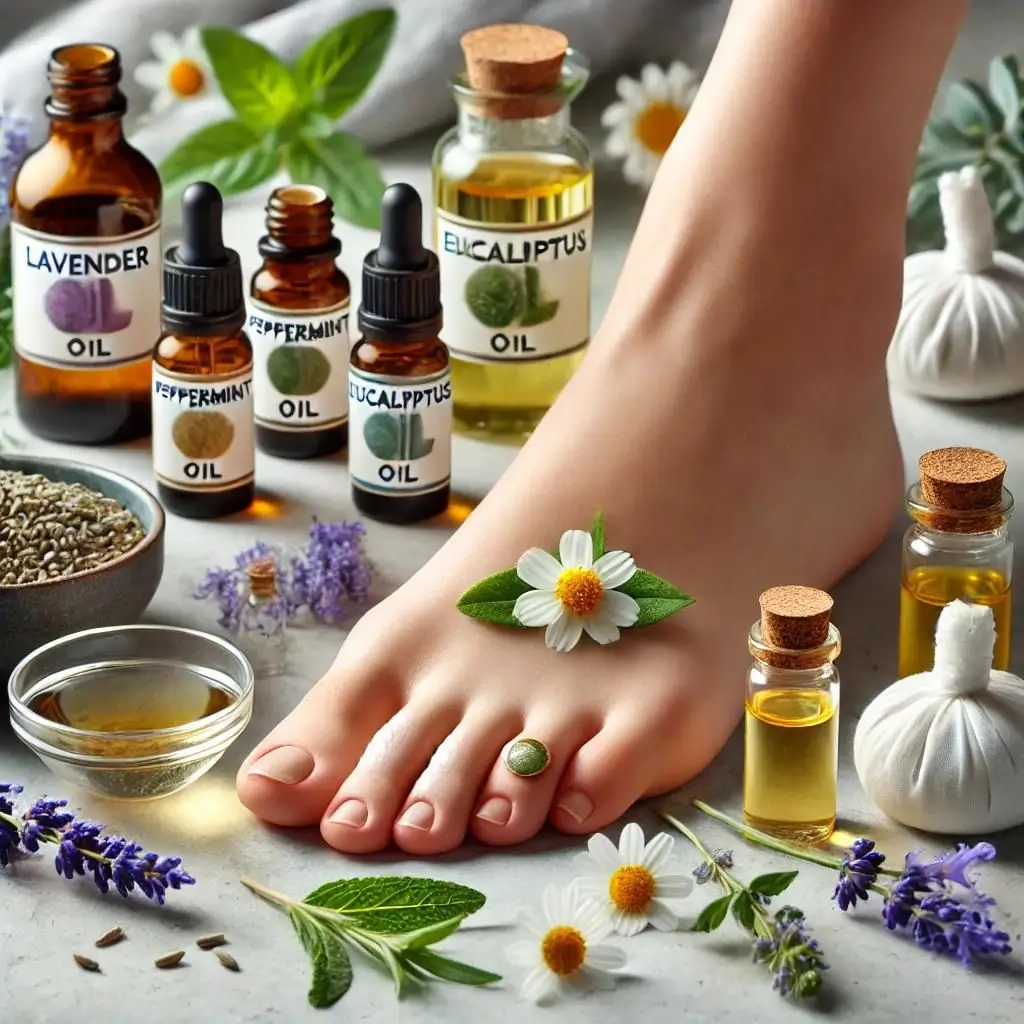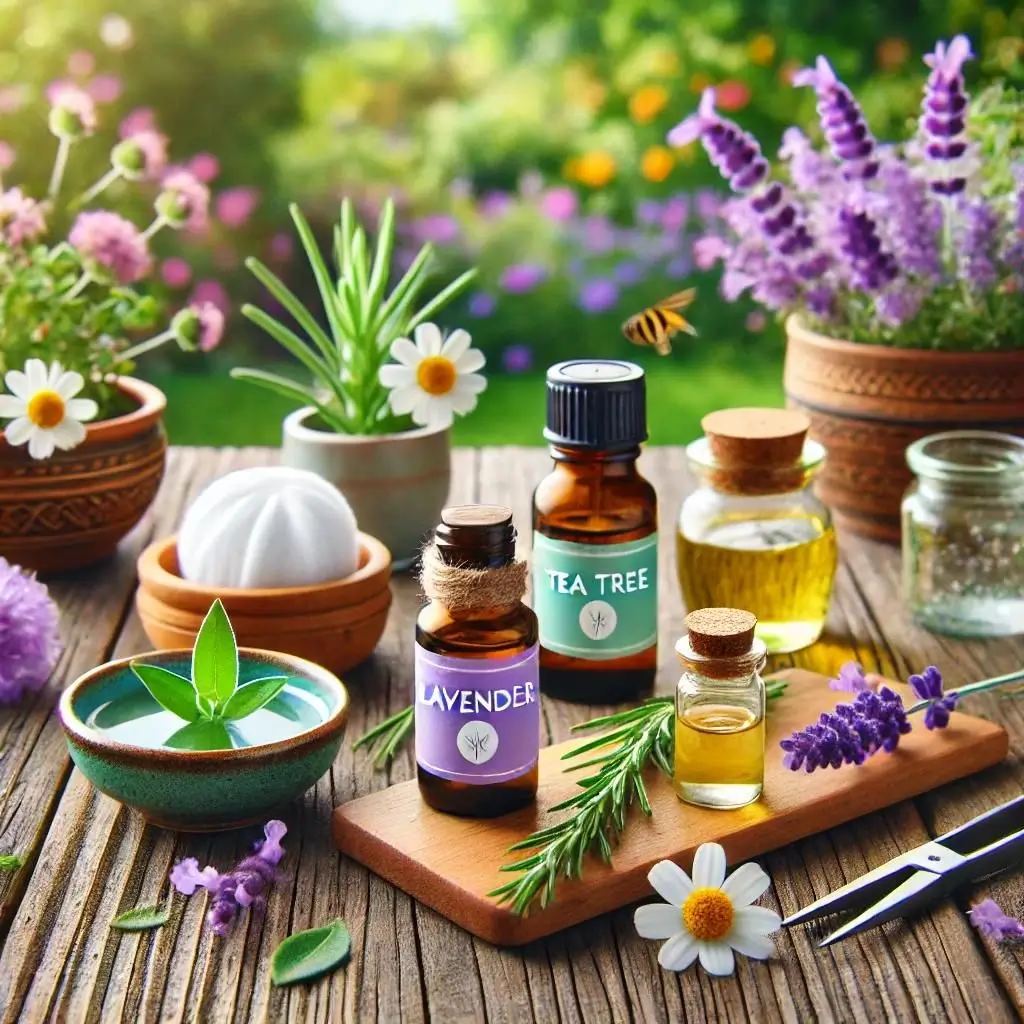Bunions are bony bumps that form on the joint at the base of your big toe, causing discomfort and pain. While medical treatment is often necessary, essential oils can offer natural relief. These oils, derived from plants, have anti-inflammatory, analgesic, and soothing properties that may help manage the symptoms of bunions. In this article, we’ll explore how essential oils can help with bunions, the best oils to use, and how to apply them effectively.
How can essential oils help with bunions?
Essential oils can provide relief from bunion symptoms through their various therapeutic properties. Here’s how:
- Anti-inflammatory effects: Many essential oils have anti-inflammatory properties that can reduce swelling around the bunion.
- Pain relief: Essential oils can act as natural analgesics, alleviating the pain associated with bunions.
- Improved circulation: Certain oils can enhance blood flow, which may help in reducing the discomfort and stiffness caused by bunions.
- Skin care: Some essential oils have skin-soothing properties that can prevent irritation and cracking around the bunion.
- Relaxation: The calming aroma of essential oils can help reduce stress and muscle tension in the feet.
What are the best essential oils for bunions?
When selecting essential oils for bunions, it’s crucial to choose oils known for their anti-inflammatory and analgesic properties. The following oils are highly recommended:
| Essential Oil | Key Benefits |
|---|---|
| Lavender | Anti-inflammatory, analgesic, calming |
| Peppermint | Cooling, pain relief, anti-inflammatory |
| Tea Tree | Anti-inflammatory, antimicrobial |
| Eucalyptus | Anti-inflammatory, pain relief |
| Frankincense | Anti-inflammatory, promotes healing |
| Chamomile | Anti-inflammatory, soothing |
These oils can be used individually or combined to create a more effective blend.
How to use essential oils to treat bunions?
Using essential oils for bunions involves a few simple steps:
- Dilution: Always dilute essential oils with a carrier oil (like coconut, almond, or olive oil) to prevent skin irritation. A typical dilution ratio is 3-5 drops of essential oil per tablespoon of carrier oil.
- Application: Gently massage the diluted oil onto the bunion and surrounding area. This helps to improve absorption and stimulate blood flow.
- Soaking: Add a few drops of essential oils to a warm foot bath. Soak your feet for 15-20 minutes to enhance relaxation and pain relief.
- Compress: Soak a cloth in warm water mixed with essential oils and apply it as a compress to the bunion.
Can essential oils reduce bunion pain?
Yes, essential oils can significantly reduce bunion pain. Oils like lavender and peppermint are particularly effective due to their analgesic properties. Applying these oils can provide a cooling sensation and reduce discomfort. Here are some specific ways to use essential oils for pain relief:
- Lavender Oil: Known for its soothing properties, lavender oil can help reduce pain and inflammation. Apply diluted lavender oil directly to the bunion or add it to a foot soak.
- Peppermint Oil: This oil has a cooling effect that can numb pain. Mix a few drops with a carrier oil and massage onto the bunion.
Are there any risks of using essential oils for bunions?
While essential oils are generally safe, there are some risks to be aware of:
- Skin Irritation: Undiluted essential oils can cause skin irritation or allergic reactions. Always dilute them with a carrier oil.
- Allergic Reactions: Perform a patch test before using a new essential oil to ensure you don’t have an allergic reaction.
- Pregnancy and Nursing: Some essential oils are not recommended for pregnant or nursing women. Consult a healthcare provider before use.
How long does it take to see results using essential oils on bunions?
The time it takes to see results from using essential oils on bunions varies. Consistent application is key. You might start noticing improvements in pain and inflammation within a few days, but significant changes could take several weeks. Patience and regular use are essential for the best outcomes.
Can essential oils prevent the progression of bunions?
While essential oils can alleviate symptoms, they cannot stop the progression of bunions. However, they can support overall foot health and reduce discomfort, which might slow down the worsening of symptoms. Combining essential oils with other treatments like proper footwear and orthotics can provide better results.
What essential oil blends are recommended for bunions?
Creating blends can enhance the effectiveness of essential oils. Here are a few recommended blends:
- Pain Relief Blend:
- 3 drops of Lavender oil
- 2 drops of Peppermint oil
- 1 tablespoon of Carrier oil
- Anti-inflammatory Blend:
- 3 drops of Frankincense oil
- 2 drops of Eucalyptus oil
- 1 tablespoon of Carrier oil
- Relaxing Foot Soak Blend:
- 4 drops of Chamomile oil
- 3 drops of Tea Tree oil
- 1/2 cup of Epsom salts
Mix the oils with the carrier oil and apply as needed.
Are there any other natural remedies for bunions besides essential oils?
Yes, there are several natural remedies that can complement the use of essential oils:
- Epsom Salt Soak: Soaking your feet in Epsom salt water can reduce inflammation and pain.
- Foot Exercises: Regular stretching and strengthening exercises for your feet can help alleviate bunion discomfort.
- Proper Footwear: Wearing shoes with a wide toe box and good arch support can prevent further irritation.
- Ice Packs: Applying ice packs to the bunion can reduce swelling and numb pain.
- Bunion Pads: Using bunion pads can protect the bunion from friction and pressure.
How to choose high-quality essential oils for bunion treatment?
Selecting high-quality essential oils is crucial for effective treatment. Here are some tips:
- Purity: Look for oils that are 100% pure and free from additives or synthetic ingredients.
- Source: Choose oils from reputable brands that provide information on the sourcing and extraction methods.
- Testing: Opt for oils that have undergone third-party testing for quality and purity.
- Packaging: Essential oils should be stored in dark glass bottles to protect them from light and degradation.
Reliable brands like doTERRA and Young Living are known for their high-quality essential oils.
Conclusion
Essential oils can be a valuable addition to your bunion care routine, offering natural relief from pain and inflammation. By choosing the right oils and applying them correctly, you can manage the discomfort associated with bunions effectively. Remember to use high-quality oils and consult with a healthcare provider if you have any concerns.




